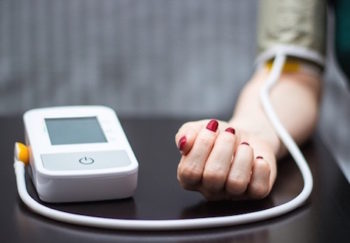
Has it ever felt like your cold medicine is increasing your heart rate?
This could be caused by an active ingredient commonly found in over-the-counter cold medications — also known to affect blood pressure.
The ingredient is pseudoephedrine, a decongestant marketed under the brand name Sudafed.
When suffering from a cold or allergies, it’s tempting to grab the first medication you see in the pharmacy aisle. Especially when the packaging lists all your symptoms in big, bold letters.
But be sure to read the list of active ingredients on the back of the packaging. They may be in smaller print, but they can come with unexpected side effects.
The Science Behind Pseudoephedrine
When you have a cold or an allergy attack, your white blood cells gather in your nasal passages and sinuses. This causes nasal membranes to swell and increases mucus production. Pseudoephedrine constricts these blood vessels, which decreases drainage.
But those same constricted vessels might also increase your blood pressure and heart rate.
Pharmacist Kayla Ryan explains the mechanism of pseudoephedrine. “Pseudoephedrine is chemically similar to adrenaline, so the body recognizes it as adrenaline, causing the blood pressure and heart rate to increase.”
She refers to one of the last major studies of the effects of pseudoephedrine on blood pressure, which took place in 2005. This study found that pseudoephedrine increased systolic blood pressure (the top number) by one point on average, while heart rate increased by an average of three beats per minute.
Ryan adds that the immediate-release products had a greater impact on heart rate and blood pressure than their 12 hour or 24 hour extended-release counterparts, which showed a smaller increase in blood pressure.
In 2005, the FDA passed the Combat Methamphetamine Act, which requires pharmacies to sell all medications containing pseudoephedrine behind the counter. At your local drugstore, you’ll find cards in the cold and flu aisle with information for these medications. You can take the card to the pharmacist, who is required to scan your driver’s license before purchase.
You may recognize many of the brand names of products containing pseudoephedrine as ending with a “D,” such as Mucinex-D or Claritin-D.
More Meds that can Raise Blood Pressure
Besides pseudoephedrine, cold and allergy sufferers with hypertension should be wary of:
- Afrin nasal spray (which contains oxymetazoline)
- Multi-symptom cold products with NSAIDs (non-steroidal anti-inflammatory drugs, such as ibuprofen or naproxen)
If you take prescription medications that increase your blood pressure, such as Adderall or albuterol inhalers, the oxymetazoline in Afrin can also increase your blood pressure through a combined effect.
NSAIDs cause the body to retain fluid and may affect kidney function, which may increase blood pressure.
Fortunately, if you have high blood pressure, there are safer alternatives when cold and allergy season come around.
Phenylephrine
For those with high blood pressure, phenylephrine is an alternative to pseudoephedrine. They are in the same drug class known as nasal decongestants, which help relieve sinus congestion and pressure. You can buy products containing phenylephrine right off the shelf at the pharmacy.
Although there haven’t been studies measuring the effects of phenylephrine on blood pressure, experts believe it has less of an impact than pseudoephedrine.
Coricidin and Benadryl: Alternatives that Won’t Affect Blood Pressure
If you’re looking for a safe cold medicine for high blood pressure, consider Coricidin. Coricidin is an over-the-counter multi-symptom product marketed specifically for patients with high blood pressure. It comes in many varieties and contains different active ingredients that target coughs, colds, chest congestion and allergies.
For runny nose, drainage, or allergy symptoms, you may want to consider diphenhydramine, marketed under the brand name Benadryl. Diphenhydramine is an antihistamine that will help keep your sinuses clear. Drowsiness is a common side effect of this medication, so it is best taken at bedtime. For non-drowsy antihistamines, consider Zyrtec, Claritin, and Allegra.
Guaifenesin, the active ingredient in Mucinex, is an expectorant that helps you cough up mucus when congested. This medication is also safe to use if you have high blood pressure.
Old Cold Meds?
Putting drugs in the garbage or flushing them down the toilet has risks. With the drug take-back program, you can deposit expired or unwanted medication.
Shopping Smart for the Heart
The next time you’re staring down the long shelves of the cough and cold aisle, look past the list of symptoms in bold letters and make sure you consider the active ingredients in the smaller print.
If you suffer from hypertension, your heart will thank you.
And don’t forget, there’s more to decongesting than taking medication: drink more liquids, try using a humidifier, consider rinsing your sinuses with a saline solution and get lots of rest.


there is a lot of cold medicine for high blood pressure, but depends on the circumstances one can take the cold mediciation.
I want to just say thank you for this article. I been suffering from high blood pressure for a while and really didn’t know what to do for cold, mucus. Also allergy, bit now I know what to shop for.
PHENYLEPHRINE can cause issue to individuals with hypertension according to my doctor.